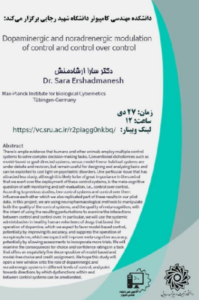دانشکده مهندسی کامپیوتر خبر داد:
دانشکده مهندسی کامپیوتر دانشگاه شهید رجایی در راستای آشنایی پژوهشگران با حوزه های تحقیقاتی نوین و همچنین ایجاد ارتباط بین محققین فعال سلسه وبینارهای تخصصی برگزار می کند. اولین وبینار از سلسله وبینارهای فوق با سخنرانی خانم دکتر سارا ارشادمنش برگزار می شود. در این جلسات ضمن دعوت از پژوهشگران صاحب نظر در حوزه های کاری مختلف برای سخنرانی، امکان پرسش و پاسخ بین شرکت کنندگان و سخنران جلسه نیز فراهم شده است. از این رو شرکت در این جلسات برای علاقمندان اکیدا توصیه می شود.
موضوع وبینار:
Dopaminergic and noradrenergic modulation of control and control over control
زمان برگزاری: ۲۷ دی ماه ۱۳۹۹، ساعت ۱۲:۰۰
سخنران وبینار:
Dr Sara Ershadmanesh
Max-Planck Institute for Biological Cybernetics – Tübingen – Germany
لینک ورود به جلسه:
https://vc.sru.ac.ir/r2piagg0nkbq/
خلاصه ای از محتوای وبینار:
There is ample evidence that humans and other animals employ multiple control systems to solve complex decision-making tasks. Conventional dichotomies such as model-based or goal-directed systems, versus model-free or habitual systems are under debate and revision, but remain useful for designing and analyzing tasks and can be exploited to cast light on psychiatric disorders. One particular issue that has attracted less study, although it is likely to be of great importance in the control that we exert over the deployment of these control systems, is the meta-cognitive question of self-monitoring and self-evaluation, i.e., control over control. According to previous studies, two control systems and control over them influence each other which we also replicated part of these results in our pilot data. In this project, we are using neuropharmacological methods to manipulate both the quality of the control systems, and the quality of meta-cognition, with the intent of using the resulting perturbations to examine the interactions between control and control over control. In particular, we will use the systemic administration in healthy human volunteers of drugs that boost the operation of dopamine, which we expect to favor model-based control, potentially by improving its accuracy, and suppress the operation of norepinephrine, which we expect will improve meta-cognitive accuracy, potentially by allowing assessments to incorporate more trials. We will examine the consequences for choice and confidence ratings in a task that offers an exquisitely fine decomposition of model-based and model-free choice and credit assignment. We hope this study will open a new window onto the role of dopaminergic and noradrenergic systems in different levels of control, and point towards directions by which dysfunctions within and between control systems can be ameliorated




